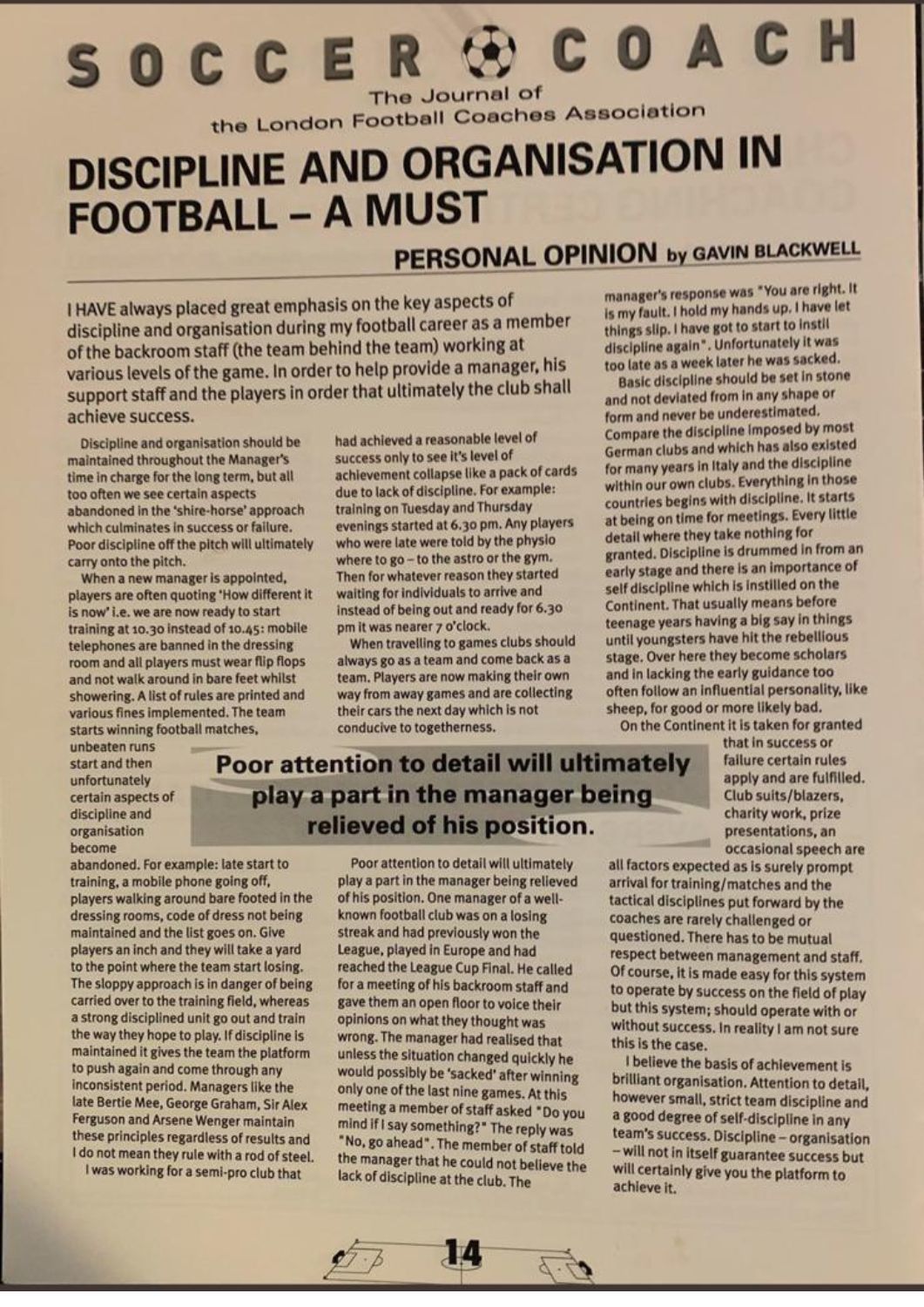GEORGE LAKIN LOOKS AT THE IMPORTANCE OF DISCIPLINE TO VITOR PEREIRA'S SUCCESS
Over the past month or two, I’ve been talking to Gavin Blackwell, a physiotherapist with over a thousand league games to his name. The insight fans can gain from someone who has been inside the game, inside dressing rooms, and in and around the training ground day in, day out, is invaluable.
Gavin has pretty much seen it all throughout his career, but wherever he’s been, there’s one template that has proven time and time again to be pretty much bulletproof: discipline and organisation. For Gavin, these things are absolutely integral to building and sustaining successful football teams.
In a career spanning decades, in which Blackwell has also worked as a backroom staff member in and around non-league football, he has witnessed firsthand the triumphs and pitfalls of football management. His insights into leadership, as outlined in his article ‘Discipline and Organisation in Football – A Must’, provide a lens through which we can assess the failings of Gary O’Neil at Wolves and the potential for a brighter future under Vitor Pereira, which, for my money, we are already beginning to see come to fruition.
Gavin Blackwell: The Architect of Discipline
For Blackwell, discipline and organisation are non-negotiable in football. His aforementioned article outlines the systemic approach needed to create a winning culture. Blackwell’s core principles include:
- Attention to Detail: Small lapses, such as tolerating lateness or allowing mobile phone use, can snowball into larger issues that erode team unity and focus.
- Consistent Standards: Regardless of success or failure, managers must enforce clear expectations to prevent complacency.
- Team Discipline as a Foundation for Success: Blackwell argues that discipline transcends tactics, becoming the backbone of a team’s identity.
- Managerial Accountability: A manager must take responsibility for lapses in discipline and address them immediately before they spiral out of control.
- Cultural Integrity: Football clubs must guard against individuals who prioritise self-promotion over the collective goal.
Through these principles, Blackwell promotes the idea that success is not merely the result of talent but the product of a disciplined, united team operating under clear leadership.

How Discipline Broke Down at Wolves Under Gary O’Neil
Blackwell’s reflections offer a striking parallel to the issues Wolves faced during Gary O’Neil’s tenure. While O’Neil inherited a team with potential, Wolves lacked the structure and consistency needed to thrive in the Premier League. Under his management, small but crucial lapses in discipline began to emerge—exactly the kind of issues Blackwell warns about.
1. Lapses in Standards
Blackwell describes how “the odd lateness tolerated” or “mobile phones in training” are early signs of a deeper malaise. Under O’Neil, Wolves were plagued by inconsistent performances, which could stem from a lack of cohesive standards across the team. Reports of poor communication between the coaching staff and players further suggest that discipline and organisation were not adequately enforced.
If rumours since his departure are to be believed, players were turning up late, cliques were beginning to form, and one or two ‘bad eggs’ were starting to rule the roost. Of course, this is all hearsay, but there is no smoke without fire. Pereira appears to have put paid to all that, and seemingly, in upsetting the applecart, he has made Wolves an altogether happier place to be.
2. The Halo-to-Noose Phenomenon
In Blackwell’s words, managers “start with a halo and end in a noose” when they fail to address creeping indiscipline. In other words, O’Neil began as the good guy, joining in with training and being quite ‘matey’ with the players. Gavin has seen this before, and there is no doubt it works well to begin with, but eventually, like in any sector, football teams need a leader, and ultimately they have to be an enforcer.
Modern football has leant towards a ‘head coach’ rather than ‘manager’ model, which somewhat complicates the situation. Essentially, though, it’s all jargon. Football clubs need figureheads, the final decision-makers on whom the final word always falls. Someone who is feared and respected in equal measure. I think there was a loss of that under Gary, illustrated mainly by the sacking of the set-piece coach, which brought forth questions at the time about who is truly responsible for what. For me, and I think for most, that is simple—the manager. Any attempts to circumvent or shirk this responsibility just screams weakness. And with that comes a splintering of the team as a unit; from that point on, I feel O’Neil’s tenure was doomed.
Once a team smells weakness at the helm, complacency—which Gavin warns against—becomes rife. And so Wolves’ early promise under O’Neil gave way to disjointed performances, mirroring Blackwell’s observation that a team can collapse “like a pack of cards” once small cracks go unaddressed.
Managerial Responsibility
Blackwell recalls a pivotal moment during Howard Wilkinson’s tenure at Leeds when the manager admitted he had let standards slip—but by then, it was too late. A similar pattern appeared at Wolves, with O’Neil struggling to regain control of a squad that seemed increasingly directionless.
The post-match outbursts against West Ham and Leicester were evidence enough of this. Captain (Lemina) going head to head with first-team coach (Derry) revealed to us all a complete capitulation and pointed to the temperament within the camp that had clearly been simmering for some time behind the scenes. They were grim times, and to be brutally honest, at that point, I truly thought we were broken beyond repair. Pereira, however, with his composure and level-headedness, has brought hope through a sense of balance and calm.
The Victor Pereira Era: A Fresh Start
Victor Pereira’s arrival at Wolves offers hope for a turnaround, precisely because his management style aligns closely with Blackwell’s principles. Pereira is known for his meticulous attention to detail, a trait that Wolves desperately need after the inconsistent leadership under O’Neil.
While Gary was no stranger to attention to detail in and of itself, his tenure highlights just how important it is to remain focused on the right areas. There is no doubt he began to lose track of where exactly he ought to have been looking. This rendered his self-proclaimed, and I still think genuine, ‘extreme attention to detail’ not just useless but actually counterproductive and self-destructive. It appeared from the outside that the harder he searched for solutions, the further away from them he got. It became a vicious, vicious circle.
Vitor’s attention to detail, on the other hand, feels more focused, more purposeful; it is within the system that he plays. The system will not change, the players and the qualities they can bring to the table must be assessed in accordance—how can they be optimised to benefit said system? Under O’Neil, it felt like this concept had been flipped on its head. He was in desperate pursuit of a system that would benefit his players. In his futile search, he somewhat lost himself, his philosophy, his system. That more than anything else was what became most apparent on the pitch—for the most part, a total lack of cohesion.
Rebuilding Discipline
Pereira has already begun implementing stricter training regimens and clearer expectations for players. This aligns with Blackwell’s assertion that “strict team discipline and self-discipline in any team’s success” provide the foundation for long-term achievement. By addressing the lapses that plagued Wolves under O’Neil, Pereira has the opportunity to rebuild the team’s identity.
Blackwell highlights the importance of managerial accountability in maintaining discipline. If any individual disrupts that, Pereira has shown he is more than willing to deal with that head-on. Look no further than the swift departure of Mario Lemina. A situation I thought he handled incredibly well. His consummate professionalism was in stark contrast to Lemina’s and set a clear example to the rest of the team—who, of course, remain.
Pereira took ultimate accountability of an incredibly difficult situation, and he looked completely unfazed. This whole unfortunate episode in itself has a clear silver lining: it’s done wonders for reinstating a culture of accountability at Wolves; if you are not willing to put the work in, this manager will have absolutely no qualms when it comes to showing you the door. Everyone must pull their weight, everyone must be fully on board. Early signs are that Mario Lemina’s replacement, Marshall Munetsi, brings this mentality in spades.
One of the most damaging aspects of Wolves’ struggles under O’Neil was the apparent lack of cohesion within the squad. They just didn’t appear to be ‘gelling’. This issue starts on the training field. Blackwell warns against allowing players to operate in silos, prioritising individual success over the team’s goals. Relying on individuals and individual moments to bail the team out, and in doing so placing individuals on pedestals (something O’Neil was heavily criticised for during his tenure). Pereira’s focus on collective success and his ability to inspire unity could be the key to revitalising Wolves. After all, football is a team game.
Why Wolves’ Future Looks Bright
Gavin Blackwell’s insights remind us that football is as much about discipline and organisation as it is about skill and strategy. Under Gary O’Neil, Wolves fell into the trap of complacency borne of complexity, allowing small lapses to snowball into larger issues that undermined the team’s performance. There’s no doubt about it, he took his eye off the ball. Victor Pereira, with his emphasis on structure and accountability, represents a chance to course-correct. His system is simple, reliable, and understandable. The roles he asks players to fulfil are definitive—Bellegarde slotting in to perform so admirably against Villa speaks to that.
If Wolves under Pereira’s stewardship can continue to embrace the principles Blackwell champions—rigorous discipline, consistent standards, and a unified team culture—they may yet fulfil their potential, something this squad is undeniably teeming with. It won’t be this season, 17th is, after all, the only objective. But going forward, as Blackwell aptly concluded in his article, “Discipline will not in itself guarantee success, but it will certainly give you the platform to achieve it.” My gut tells me Vitor Pereira is onto something here, he’s building that very platform, and with adequate backing in the summer, this club could very well start looking upwards once again.
Final Word From Gavin Blackwell
More than anything I want my reflections on the goings on at Wolves to be more balanced than critical of Gary O’Neil. Ultimately, it is good to see a manager back at the helm who places values so similar to my own, and so similar to what I have seen work across my career. There is evidence enough to suggest that discipline as a cornerstone is a fruitful strategy.
Further to this, in the time since speaking with George, I have read Alex Ferguson’s Leadership and Managing My Life. In his book, Ferguson endorses many of the principles of discipline I myself uphold. Here is a snippet I thought was worth sharing:

I always felt that our triumphs were an expression of the consistent application of discipline. It may surprise some to learn that much of the success comes from not getting carried away or trying to do the impossible and taking too many risks.
I placed discipline above all else and it might have cost us several titles. If I had to repeat things, I’d do precisely the same, because once you bid farewell to discipline you say goodbye to success and set the stage for anarchy.
Discipline is the most important factor in football. The minute the player thinks he is bigger than the manager, your club is dead. The history of Barcelona, Real Madrid, Manchester United, AC Milan – all the great clubs – are based on discipline.
You can never lose control not when you are dealing 40 professionals who are all millionaires. If they misbehave we fine them, but we keep it indoors. And if anyone steps out of control that’s them dead.
When critics of our game parade their theories about attributes that lift certain teams above others. I am always amused by the eagerness to concentrate almost exclusively on technical and tactical comparisons. Frequently they discuss football in abstract terms, overlooking the reality that it is played by creatures of flesh and blood and feeling. Tactics are important but they don’t win football matches. Men win football matches. The best teams stand out because they are teams because individual members have been truly integrated that the team functions with a single spirit. There is a constant flow of mutual support among players, enabling them to feed off strengths and compensate for weaknesses.
They depend on one another, trust one another. A manager should engender that sense of unity. He should create a bond among the players and between him and them that raises performance to heights that were unimaginable when they started out as desperate individuals.
– Alex Ferguson’s Leadership and Managing My Life.
It’s early days but much of this seems to cross over with Vitor Pereira’s philosophy, which is, in a nutshell ‘the standards you set are the standards you get.’ He appears to have set the tone at the club. The bar has been raised.
Finally, having worked as a backroom staff member my entire career, I will leave you with this great example about the backroom staff ethos (referencing a physio pal of mine Ian Liversedge- an experienced head who has been around as long as me.) I think Micky Mellon highlights and sums up the importance perfectly well and most significantly of all, the total trust of his lieutenants:

“A manager can’t be on his own, you’re going to need good people around the club when I’m not there in order to keep driving the culture that we believe is the right way to be a good footballer,” said Mellon of his backroom changes.
“What sometimes can happen is that people don’t push and challenge behaviours when I’m not there. What you have to be able to do. What you have to be able to get from your staff is when I’m not there, everybody’s challenging that, everybody’s saying ‘that’s not how a good team operates, that’s not a good player behaviour or a good player attitude’, and then that will go into the team.
“I’ve got a lot of players that will do that as well now. I’ve got players in there that will say ‘that won’t make us successful, behaving like that or training like that’. We need an all-in group in order to work well.
“I want to make Oldham smile again, I want the fans to smile, so that’s what I need, and those guys that I’ve brought in will help me to do that, at all times – not just when it’s sunny but when things get tough, or whatever. Those guys will still be driving it on, and they’re all people who have had success in their careers so they know what it takes so all around about the place there are lots of positives.”
– Micky Mellon in the Oldham Times

ARTICLE BY GEORGE LAKIN
George fell in love with Wolves the moment Colin Cameron fizzed one into the bottom corner against Plymouth Argyle on the 31st December 2005- during his first ever Wolves game as a child.
He loves digging a little deeper when it comes to Wolves, often conducting his own research to help him read between the lines and increase his knowledge and understanding of all aspects of our great club. He is keen to share his insight and findings with fans who share in his biggest love, -after his lovely wife, Amy and little boy, Tommy of course!- our mighty Wolverhampton Wanderers!
George is passionate about reaching and uniting all corners of the Wolves family, young and old, near and far. So make sure you don’t miss his weekly column exclusively for Always Wolves this season!


